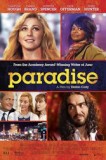| Reviews & Columns |
|
Reviews DVD TV on DVD Blu-ray 4K UHD International DVDs In Theaters Reviews by Studio Video Games Features Collector Series DVDs Easter Egg Database Interviews DVD Talk Radio Feature Articles Columns Anime Talk DVD Savant Horror DVDs The M.O.D. Squad Art House HD Talk Silent DVD
|
DVD Talk Forum |
|
|
| Resources |
|
DVD Price Search Customer Service #'s RCE Info Links |
|
Columns
|
|
|
Paradise
Somewhere between her win at the 2008 Academy Awards and 2013, Diablo Cody hit a snag on her seemingly inevitable rise to the top of the Hollywood A-list. A cult television show and two flop movies later, her legacy is mostly a name synonymous with a style crafted out of pop culture references, despite the fact that she only wrote two movies that way. Her best script to date, 2011's Young Adult, ditched the clever wordplay, painting a sharply observed portrait of a complicated woman that crackled with painful truths and excellent performances. On one hand, it seems unfair that Young Adult's poor box office doomed Cody's directorial debut to a tiny simultaneous release in limited theaters and pay cable. On the other, Paradise is so stunningly limp and off-target, it's hard to imagine one could guess it was a film she'd written without being told.
Although there are hints at what might have been, a character story about loss of faith, Paradise feels like a first draft, full of dialogue that spells out Cody's thematic points, characters that have biographies but lack soul or energy, and a long list of jokes she just ought to be way above. The character of Lamb is so roughly drawn, Cody can't even settle on how naive she's supposed to be. In one scene, she jokes she's like a Barbie that got burned with a lighter, yet in earlier voice-over, she marvels at "a restaurant with a rainforest in it!" Cody's portrayal of faith is equally schizophrenic, happy to paint believers as dopes as long as it's funny. Hunter's character tries to show solidarity for Lamb by revealing she does yoga against the Church's wishes, but it's more mocking than gentle ribbing. In the Vegas scenes, all three of Cody's leads are charming and talented, and each one conveys a little of that, but they lack the foundation on which to base their characters: Lamb's goals are non-specific, and William and Loray don't seem to have any.
Even excusing the clunkiness of the script, the comedy is shockingly lame. The film is packed with jokes added during the looping stage, mainly snipes at club women (one yells "YOLO" at her friend, another asks whether or not she should throw up again before hitting the club). Loray is taking a film class, allowing her to bring up the "magical Negro" trope in order to dismiss it, which comes off as an overly defensive move on Cody's part. Even the pop culture references, Cody's most infamous calling card, fail to gain any traction. Sample line: "Last time someone Googled me, it was before Google even existed. They had to Altavista me." The line comes out of nowhere and provides no insight into the character that says it -- it's literally just a joke about search engines, thrown out in the middle of a bland conversation as a bit of spice. As a director, Cody's work is adequate but unremarkable, conveying the story but failing to hide the film's minimal budget and never really leaving a stamp on the material.
By the 60-minute mark, it's clear that Paradise isn't going to pull itself together, but its last stumble is the worst, hinting at something potentially interesting before falling back even harder on empty cliches. Lamb has an unexpected encounter with a particular person, and although their connection is simple and arguably trite, there's a fleeting glimpse of the raw honesty that made Young Adult such a pleasure. Sadly, Cody plays bits of the scene for awkward laughs that kill the moment, and neither the direction or script appear give Lamb the information that inspires her epiphany until after she's already had it. Issues with the following scenes (Lamb reverts back to broken for a moment that's more about William than Lamb, and Cody throws in one of the most on-the-nose visual metaphors of the year) become almost irrelevant by comparison. I admit, I was among those who disliked Juno's wordplay, but at least it had a voice; the true disappointment of Paradise is that its brand of mediocrity could've been crafted by anyone.
Please check out my other DVDTalk DVD, Blu-ray and theatrical reviews and/or follow me on Twitter.
|
| Popular Reviews |
| Sponsored Links |
|
|
| Sponsored Links |
|
|
| Release List | Reviews | Shop | Newsletter | Forum | DVD Giveaways | Blu-Ray | Advertise |
|
Copyright 2024 DVDTalk.com All Rights Reserved. Legal Info, Privacy Policy, Terms of Use,
Manage Preferences,
Your Privacy Choices | |||||||











